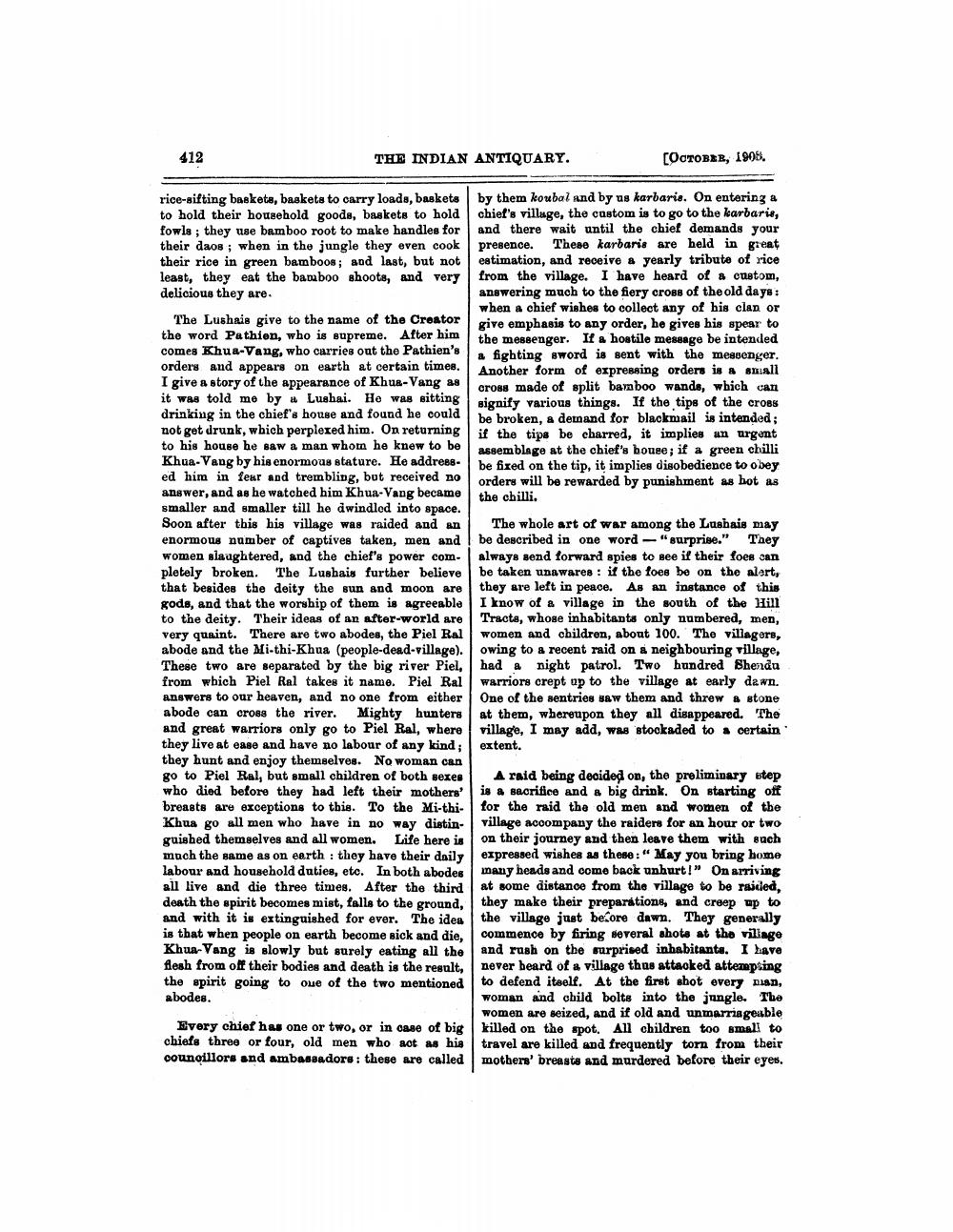________________
412
THE INDIAN ANTIQUARY.
[OCTOBER, 1908.
by them koubal and by us karbaris. On entering a chief's village, the custom is to go to the karbaris, and there wait until the chief demands your presence. These karbaris are held in great estimation, and receive a yearly tribute of rice from the village. I have heard of a custom, answering much to the fiery cross of the old days: when a chief wishes to collect any of his clan or give emphasis to any order, he gives his spear to the messenger. If a hostile message be intended a fighting sword is sent with the measenger. Another form of expressing orders is a small cross made of split bamboo wands, which can signify various things. If the tips of the cross be broken, a demand for blackmail is intended; if the tips be charred, it implies un urgent assemblage at the chief's bouse; if a green chilli be fixed on the tip, it implies disobedience to obey orders will be rewarded by punishment as hot as the chilli.
rice-sifting basketa, baskets to carry loads, baskets to hold their household goods, baskets to hold fowls; they use bamboo root to make handles for their daos ; when in the jungle they even cook their rice in green bamboos; aod last, but not least, they eat the baduboo shoots, and very delicious they are.
The Lushais give to the name of the Creator the word Pathion, who is supreme. After him comes Khua-Vang, who carries out the Pathien's orders and appears on earth at certain times. I give a story of the appearance of Khus-Vang as it was told me by . Lushai. He was sitting drinking in the chief's house and found he could not get drunk, which perplexed him. On returning to his house he saw a man whom he knew to be Khua-Vang by his enormous stature. He addressed him in fear and trembling, but received no answer, and as he watched him Khua-Vang became smaller and smaller till he dwindled into space. Soon after this his village was raided and an enormous number of captives taken, men and women slaughtered, and the chief's power com. pletely broken. The Lushais further believe that besides the deity the sun and moon are gods, and that the worship of them is agreeable to the deity. Their ideas of an after-world are very quaint. There are two abodes, the Piel Ral abode and the Mi-thi-Khua (people-dead-village). These two are separated by the big river Piel, from which Piel Ral takes it name. Piel Ral answers to our heaven, and no one from either abode can cross the river. Mighty hunters and great warriors only go to Piel Ral, where they live at ease and have no labour of any kind; they hunt and enjoy themselves. No woman can go to Piel Ral, but small children of both sexes who died before they had left their mothers' breasts are exceptions to this. To the Mi-thi- Khua go all men who have in no way distinguished themselves and all women. Life here is much the same as on earth : they have their daily labour and household duties, etc. In both abodes all live and die three times. After the third death the spirit becomes mist, falls to the ground, and with it is extinguished for ever. The idea is that when people on earth become sick and die, Khu Vang is slowly but surely eating all the flesh from off their bodies and death is the result, the spirit going to oue of the two mentioned abodes.
The whole art of war among the Lushais may be described in one word "surprise." They always send forward spies to see if their foes oan be taken unawares: if the foes be on the alert, they are left in peace. As an instance of this I know of a village in the south of the Hill Tracte, whose inhabitants only numbered, men, women and children, about 100. The villagers, owing to a recent raid on a neighbouring village, had a night patrol. Two hundred Bhendu Warriors crept op to the village at early dawn. One of the sentries saw them and threw a stone at them, whereupon they all disappeared. The village, I may add, was stockaded to a certain extent.
A raid being decided on, the preliminary step is a sacrifice and a big drink. On starting off for the raid the old men and women of the village accompany the raiders for an hour or two on their journey and then leave them with such expressed wishes as these : “ May you bring home many heads and come back unhurt!" On arriving at some distance from the village to be raided, they make their preparations, and creep up to the village just becore dawn. They generally commence by firing several shots at the village and rush on the surprised inhabitants. I have never beard of a village thus attacked attempting to defend itself. At the first shot every nian, woman and child bolts into the jungle. The women are seized, and if old and unmarriageuble killed on the spot. All children too small to travel are killed and frequently torn from their mothers' breasts and murdered before their eyes.
Every chief has one or two, or in case of big chiefs three or four, old men who act as his councillors and ambassadors: these are called




